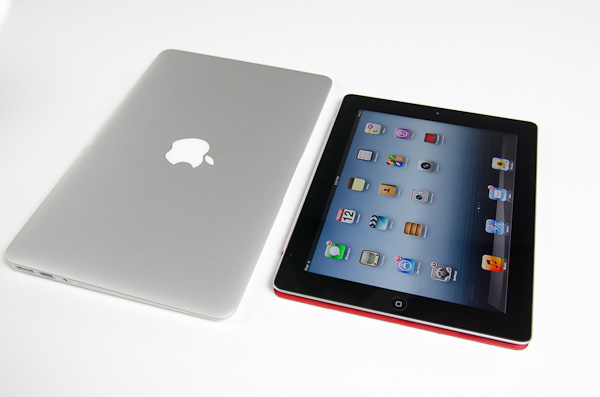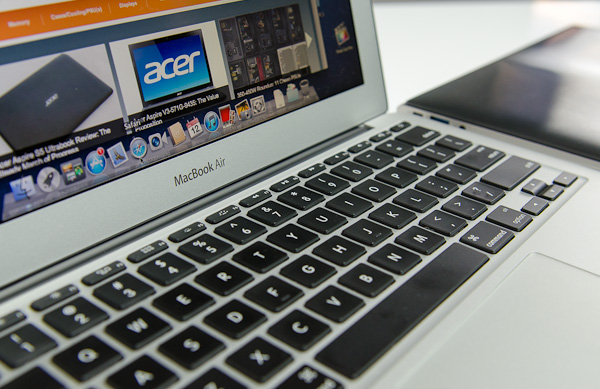The 2012 MacBook Air (11 & 13-inch) Review
by Anand Lal Shimpi on July 16, 2012 12:53 PM EST- Posted in
- Apple
- Mac
- MacBook Air
- Laptops
- Notebooks
Final Words
The MacBook Air is in its third iteration of the current design and it's tangibly better than the two that came before it. The 2010 (and older) models are just plain slow by comparison. Thanks to architectural, frequency and thermal improvements, one of the cores from a 2012 MacBook Air ends up being faster than two from a 2010 MBA. In other words, the 2012 models end up being more than twice as fast as the 2010 models in many of our CPU bound tests.
Battery life has also improved thanks to Intel's 22nm silicon. You'll get between 3 - 7 hours on the 13-inch MBA, and between 1.85 - 5 on the 11-inch model.
It's not all about Intel in the 2012 Airs however. The improvement in storage performance is even more revolutionary. Similar to the rMBP, with the 2012 MacBook Air Apple has entered the world of modern SSD performance. The impact of the faster SSDs is felt everywhere from boot to application performance. Once again there are two SSD suppliers, but unlike in previous models both can be deliver good performance. If you use FileVault or plan on working with a ton of already compressed data, you'll want to pick a 256GB or 512GB drive to end up with Samsung's controller rather than the SandForce driven Toshiba solution.
By offering 8GB RAM and 512GB SSD BTO options, Apple has made the MacBook Air even more of an upgrade for owners of older MacBook Pros. The options aren't cheap but the flexibility in an inflexible machine is important.
The only real downside to the 2012 MacBook Air is in the display department. Apple raised the bar with the 2012 iPad and Retina Display on the MacBook Pro, the MacBook Air's display is good for a TN panel but the rest of Apple's new world has moved to high resolution IPS panels. The same is starting to be true outside of Apple as well. The competition has simply caught up and surpassed Apple in the low-cost, but high-quality display business. The MacBook Air is no longer competing against poorly designed netbooks, but a bunch of clones that are quickly approaching parity across the board. The MBA panel isn't bad, but it needs to be better.
Even without a new display however, the MacBook Air continues to be one of the best executed ultraportables on the market today. If you're after absolute portability, the 11-inch model is great. If you want a Pro replacement and can get away without four cores and a discrete GPU, the 13 gets the job done. I have no issues recommending either system.
Looking forward, Haswell will have an even more significant impact on the MacBook Air next year. Without room or the thermal budget for a discrete GPU, the MacBook Air stands to benefit even more from improved processor graphics. With 2.5x the graphics compute power of HD 4000 plus embedded DRAM, Haswell's processor graphics will bring an entirely new level of gaming performance to the MacBook Air.












190 Comments
View All Comments
KPOM - Tuesday, July 17, 2012 - link
It was a selling point during the "Switcher" campaign, but I doubt that today many people are buying Macs to run Windows. They haven't run the Switcher or "I'm a Mac" ads in years.At this point, being able to run Windows natively is a bonus, more than a key selling point.
ananduser - Tuesday, July 17, 2012 - link
Only that it is not native. There's still some virtualization overhead due to bootcamp.KPOM - Tuesday, July 17, 2012 - link
It's native. There is some emulation of BIOS commands (since Macs lack a BIOS), but it isn't running in virtualization.phillyry - Tuesday, March 26, 2013 - link
Kind of opposite views between Apple and Microsoft, with regards to driver support aren't they?MS makes it easy for the user to tinker around with or build a PC by embedding a huge number of drivers in the OS. However, this accounts for a large amount of the Windows' install.
Apple, on the other hand, go for the 'streamline just for our own hardware' approach, which seems to make sense for them because they sell hardware, as well as software. You end up with a cleaner install of the OS but at the expense of DIY. Apple also focuses on the premium build and you are really paying a lot for the hardware, when you consider that you can buy OS X for $30.
Should Apple be allowed to make it difficult to build your own Mac? Should they offer a non-upgrade retail OS X for $180? I'd say sure to the second one, as a consumer but don't see how it makes sense for Apple. They would be diverting resources away from their core product lines and diluting their premium brand. Again, should they be forced to at least make it easier for DYIers and legal for OEMs? I dunno. I'd like that but, so far, the legal system doesn't seem to be going for it.
KPOM - Tuesday, July 17, 2012 - link
Microsoft won't allow Windows RT to run on any tablets other than those that it specifies. So no Android tablet or iPad will be able to run Windows RT even if it is running identical hardware to Microsoft's Surface, for example.Should we "hang" Microsoft for not allowing their OS to run on other devices?
Freakie - Tuesday, July 17, 2012 - link
Sort of a blurry line you are crossing there. Windows RT isn't quite a full OS like OSX and regular Windows in that it needs very specific optimizations and programming techniques. Not only that, but the other "hardware" that you would be running it on isn't meant for a full OS like Windows RT mostly is. While it may technically have the same CPU and GPU, *maybe* even the same wireless radios, the chances of it having the same cameras, same screens, same circuit boards and everything is actually quite improbable =P So it wouldn't be "identical" hardware. I think that Windows RT is so optimized for its specific hardware that it will be running on, that it would be rather unhappy on other things xP That's not to say that Microsoft made the right choice in just flat-out disallowing anyone from trying to put it on other devices. It's a similar boat they are in that Apple is in. OSX is not good at running on hardware that it is not specifically optimized for, and to allow people to easily put it on other hardware would degrade OSX's image.KPOM - Tuesday, July 17, 2012 - link
They aren't marketing the Surface as an "incomplete" PC. All Metro apps will need to run on Windows RT in order to get a "designed for Windows 8" certification. Windows RT just won't run the x86 legacy applications because ARM processors don't have the capability to emulate x86 or x64 without a huge performance hit.The rest of your point is entirely in line with mine. Apple designed OS X for its own line of computers. They don't want it running on other PCs and so have designed it so that it relies upon, among other things, Apple's proprietary EFI. Microsoft had previously billed itself as selling an OS that would run on practically anything. Of course, Windows has long had a reputation (somewhat undeserved) of being crash prone and buggy, most of which can be ascribed to legacy support. Windows on one of Microsoft's reference designs runs quite well. So it's no surprise they are mandating the use of reference designs for Windows RT, even though they intend the devices to be more powerful than the current generation of iPads or Android tablets.
I think Microsoft would like to get to a point where people are indifferent about Windows RT vs. Windows 8 and ARM vs Intel.
Sufo - Wednesday, July 18, 2012 - link
Compare OSX to Windows 8 and Windows RT to iOS. Comparing a mobile to a desktop OS is misleading at best.KPOM - Friday, July 20, 2012 - link
That's certainly not how Microsoft is marketing Windows RT.Starmast3r - Thursday, August 9, 2012 - link
That is exactly how Microsoft is marketing Windows RT. It is an environment designed for mobile devices.